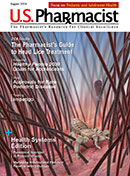Data from the EPIC-HR (Evaluation of Protease Inhibition for COVID-19 in High-Risk Patients) trial revealed that the use of nirmatrelvir plus ritonavir resulted in an 89% decrease in hospitalization or death among unvaccinated outpatients with early COVID-19; however, the clinical impact of nirmatrelvir plus ritonavir among vaccinated populations was unknown.
Findings from a recent publication in the Annals of Internal Medicine revealed the use of nirmatrelvir plus ritonavir decreased the already low risk (1%) of hospitalization among older vaccinated patients who contract COVID-19.
The researchers sought to evaluate whether nirmatrelvir plus ritonavir diminishes risk for hospitalization or death among outpatients with early COVID-19 in the setting of prevalent SARS-CoV-2 immunity and immune-evasive SARS-CoV-2 lineages.
The study was designed to mimic a clinical trial employing inverse probability–weighted models to account for anticipated bias in treatment. The population-based cohort study involved a large healthcare system providing care for 1.5 million patients in Massachusetts and New Hampshire during the Omicron variant wave during January 1, 2022, to January 17, 2022.
A total of 44,551 nonhospitalized adults (90.3% with ≥3 vaccine doses) aged 50 years or older with COVID-19 and no contraindications for nirmatrelvir plus ritonavir were included in the study.
The primary outcome was a composite of hospitalization within 14 days or death within 28 days of a COVID-19 diagnosis.
Throughout the study period, 12,541 (28.1%) patients were prescribed nirmatrelvir plus ritonavir, and 32,010 (71.9%) did not receive the combination. For those prescribed nirmatrelvir plus ritonavir, patients were more likely to be older, have more comorbidities, and be vaccinated.
The results indicated that patients who received nirmatrelvir plus ritonavir had lower risk of both hospitalization within 14 days (adjusted risk ratio [aRR], 0.60; 95% CI, 0.44-0.81) and death within 28 days (aRR, 0.29; 95% CI, 0.12-0.71) compared with patients who did not receive the treatment. Hospitalization or death occurred in 0.55% (n = 69) of patients who received nirmatrelvir plus ritonavir compared with 0.97% (n = 310) of patients who did not receive the treatment.
The authors noted limitations of the study including potential residual confounding due to differential access to COVID-19 vaccines, diagnostic tests, and treatment.
One of the strengths of the study was the large sample size, which permitted researchers to estimate the risk reduction with nirmatrelvir plus ritonavir for specific subpopulations of interest.
“This study confirms the effectiveness of nirmatrelvir plus ritonavir in preventing hospitalization and death among vaccinated and unvaccinated persons aged 50 years or older with COVID-19. Although these data suggest its clinical impact may be reduced in the context of high levels of prior immunity and consequent lower risk, the estimated 40% reduction in hospitalization and 71% reduction in death could have large population benefits if nirmatrelvir plus ritonavir is used widely,” the authors concluded.
The content contained in this article is for informational purposes only. The content is not intended to be a substitute for professional advice. Reliance on any information provided in this article is solely at your own risk.
« Click here to return to COVID-19 update.






